Module 11 Body language Unit 3 Language in use 课件(共53张PPT)
文档属性
| 名称 | Module 11 Body language Unit 3 Language in use 课件(共53张PPT) |
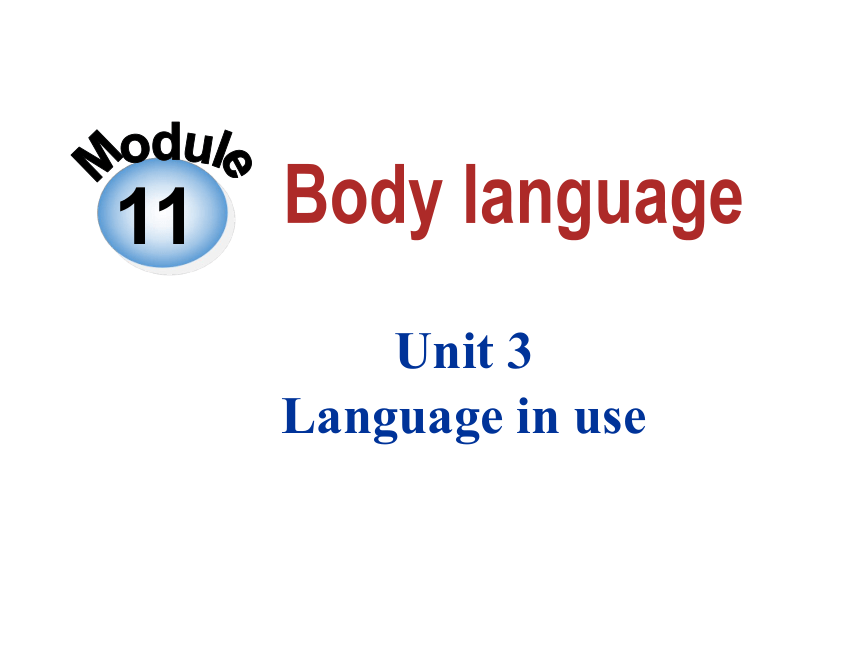
|
|
| 格式 | pptx | ||
| 文件大小 | 2.9MB | ||
| 资源类型 | 教案 | ||
| 版本资源 | 外研版 | ||
| 科目 | 英语 | ||
| 更新时间 | 2023-06-18 00:00:00 | ||
图片预览


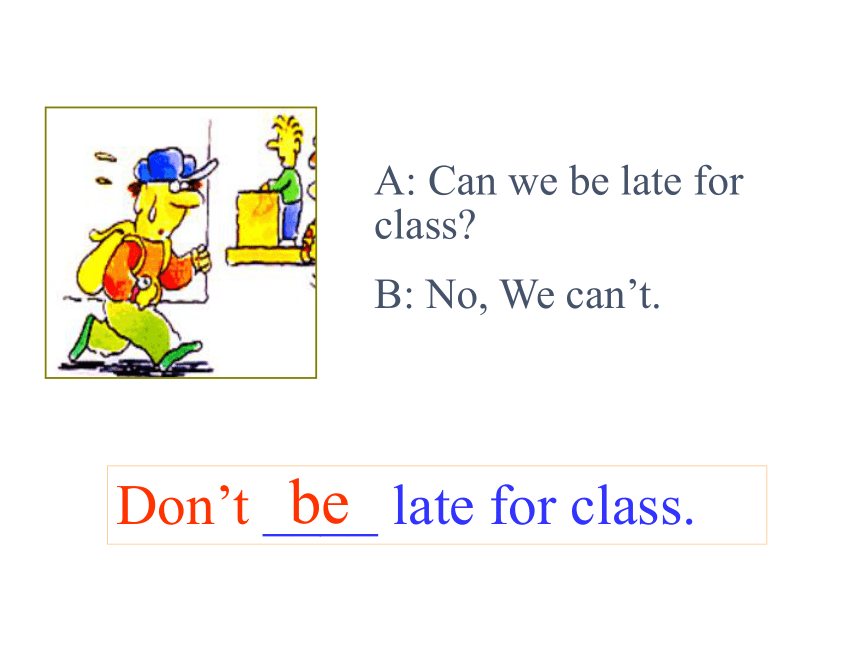
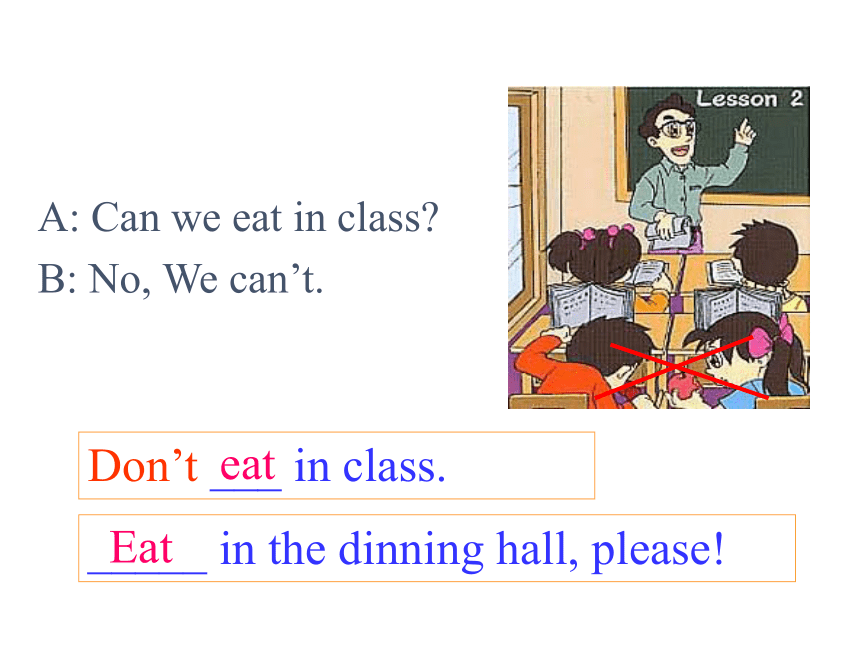
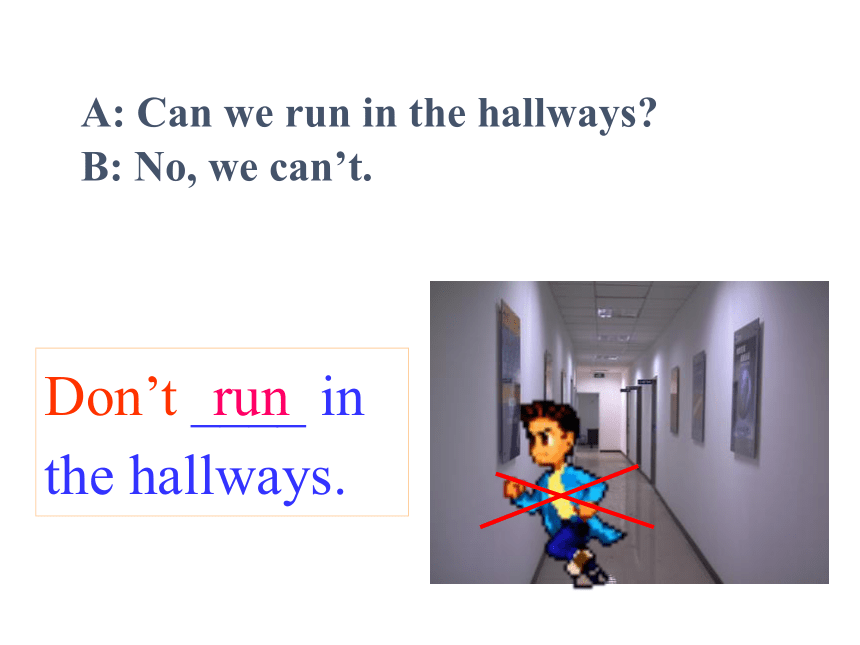
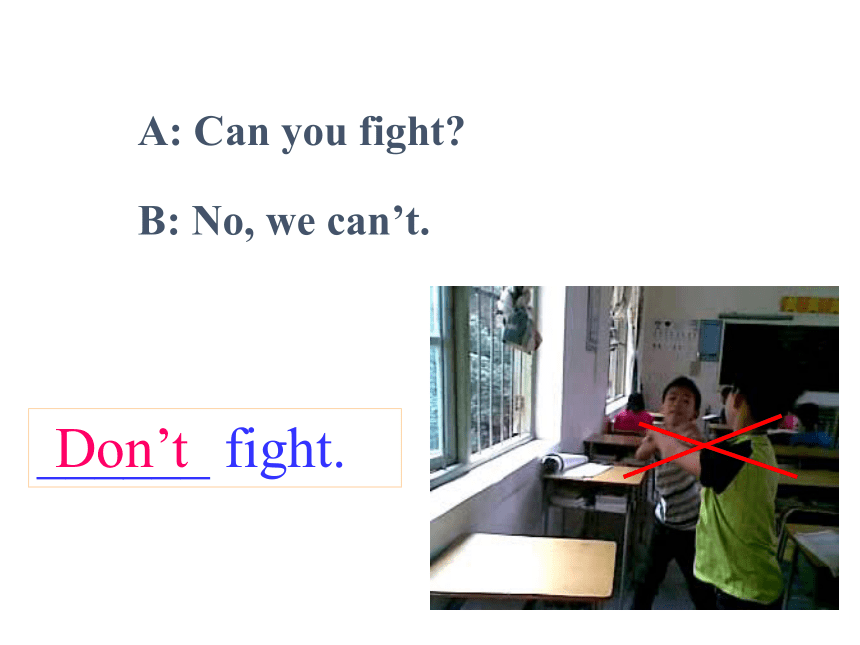
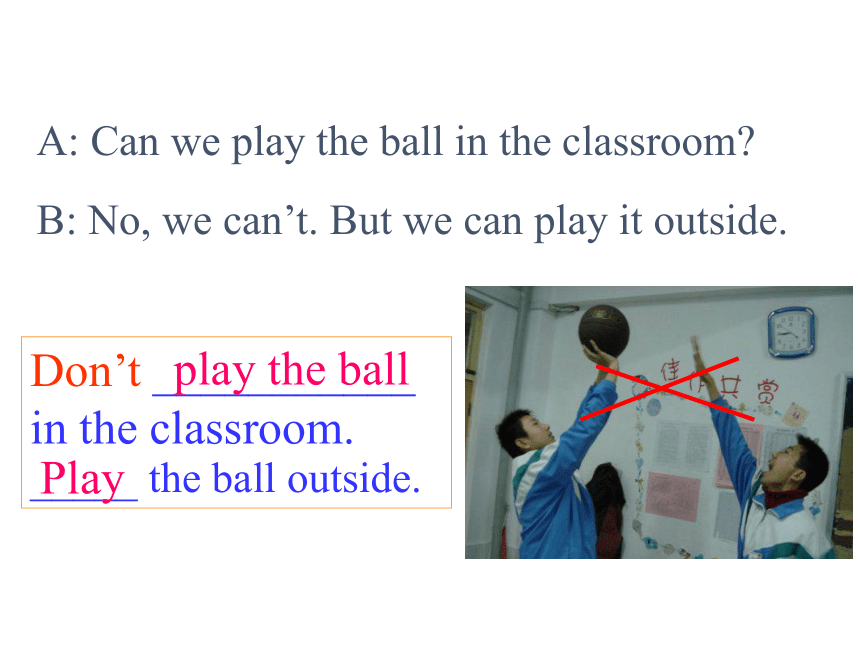
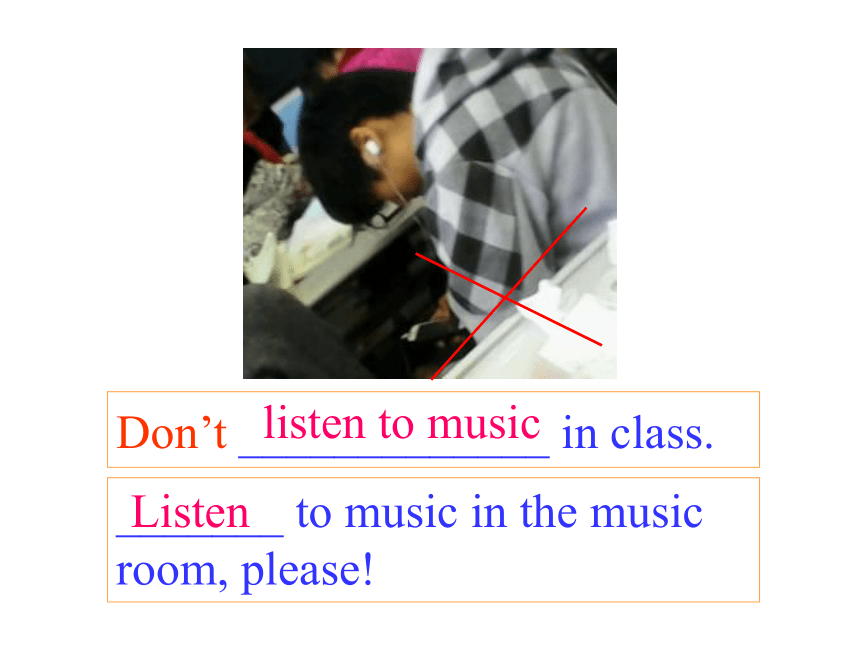
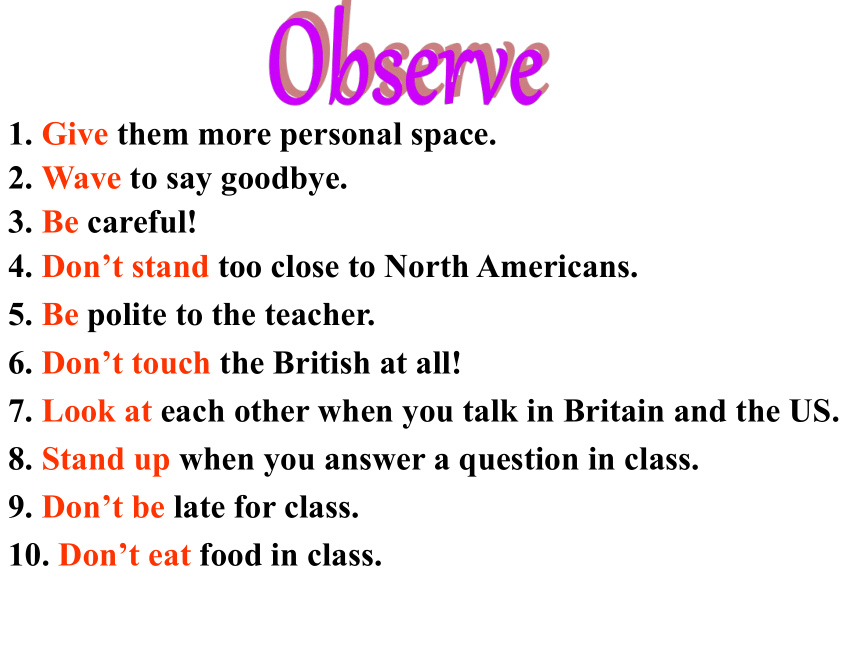
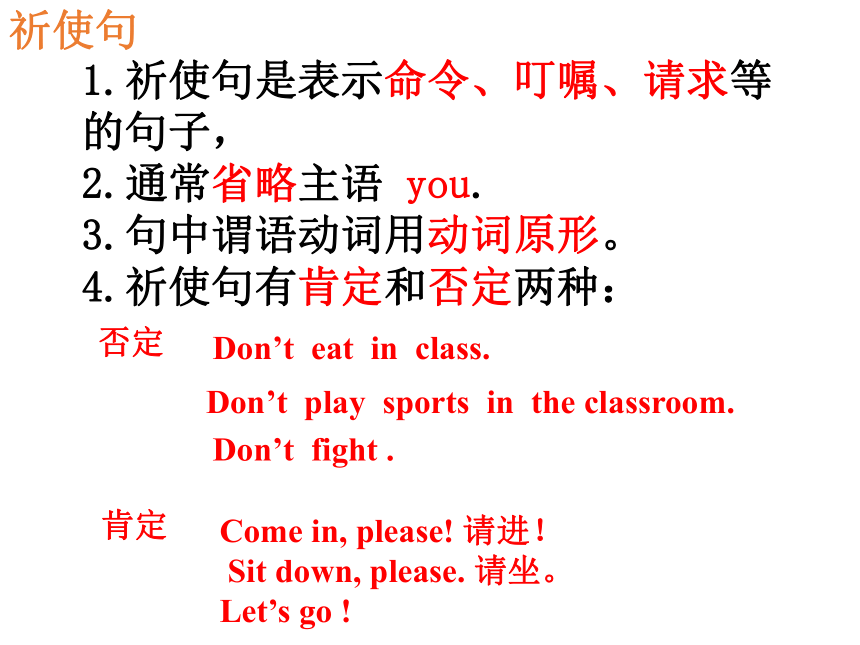
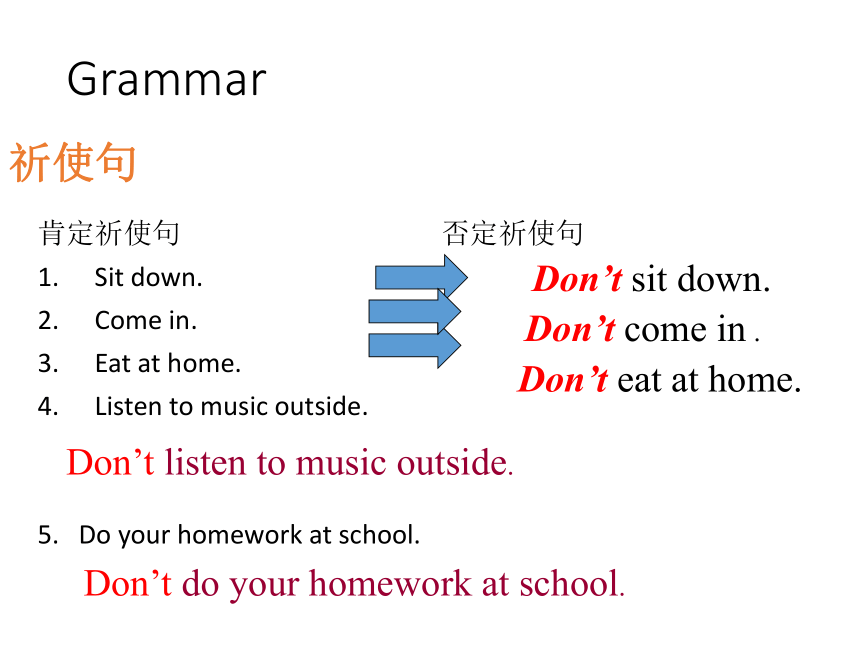
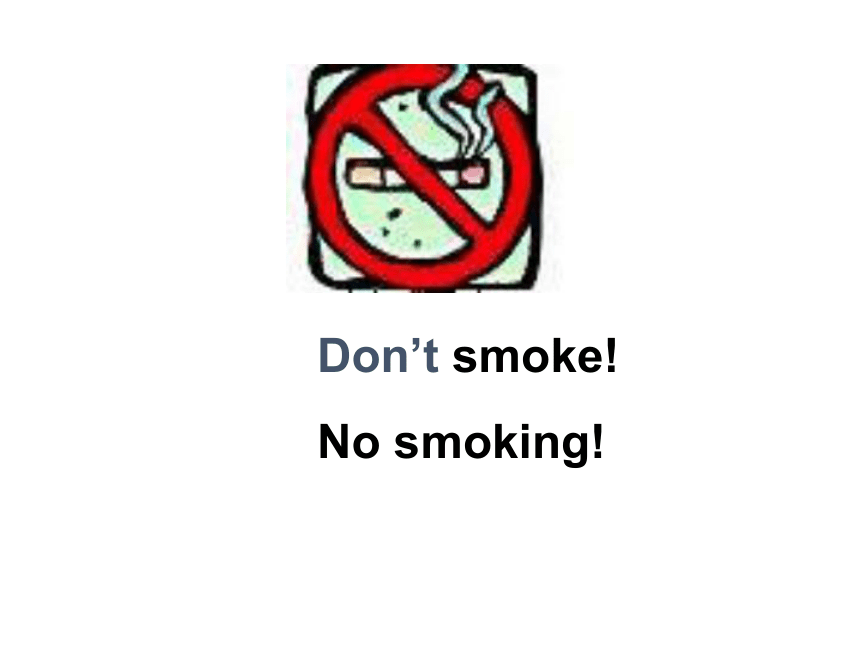
文档简介
(共53张PPT)
11
Body language
Module
Unit 3
Language in use
What can we do at school
What can’t we do at school
Discussion
A: Can we be late for class
B: No, We can’t.
Don’t ____ late for class.
be
Don’t ___ in class.
A: Can we eat in class
B: No, We can’t.
eat
_____ in the dinning hall, please!
Eat
A: Can we run in the hallways
B: No, we can’t.
Don’t ____ in the hallways.
run
A: Can you fight
B: No, we can’t.
______ fight.
Don’t
A: Can we play the ball in the classroom
B: No, we can’t. But we can play it outside.
Don’t ___________ in the classroom.
_____ the ball outside.
play the ball
Play
Don’t _____________ in class.
listen to music
_______ to music in the music room, please!
Listen
1. Give them more personal space.
2. Wave to say goodbye.
3. Be careful!
4. Don’t stand too close to North Americans.
5. Be polite to the teacher.
6. Don’t touch the British at all!
7. Look at each other when you talk in Britain and the US.
8. Stand up when you answer a question in class.
9. Don’t be late for class.
10. Don’t eat food in class.
Observe
祈使句
1.祈使句是表示命令、叮嘱、请求等的句子,
2.通常省略主语 you.
3.句中谓语动词用动词原形。
4.祈使句有肯定和否定两种:
Don’t eat in class.
Come in, please! 请进!
Sit down, please. 请坐。
Let’s go !
Don’t play sports in the classroom.
Don’t fight .
否定
肯定
Grammar
肯定祈使句 否定祈使句
Sit down.
Come in.
Eat at home.
Listen to music outside.
5. Do your homework at school.
Don’t sit down.
Don’t come in .
Don’t eat at home.
Don’t listen to music outside.
Don’t do your homework at school.
祈使句
Don’t smoke!
No smoking!
Don’t take photos here.
No photos!
Don’t take your schoolbag to the library!
in the library
No school bags!
Don’t talk in the library!
in the library
No talking!
No school bags!
No talking!=Don’t talk!
No wet umbrellas!
No listening to music!
No food!
Keep quiet!
Write the rules for the school library.
Library Rules
No talking!
No school bags!
No food!
No wet umbrellas!
No listening to music!
6.看图写句子
Which school rule is the boy breaking
答案:Don’t listen to music in class.
答案:Don’t sleep in class
答案:Don’t use mobile phone in class
1.—Don’t be late again, Mike
—_______________.
A. No, I don’t B. Don’t worry
C. Sorry, I won’t D. I don’t know
【解析】选C。
2.Which sign means “No Photos”
【解析】选C。禁止拍照。
3.Tom!________ talk loudly. My little brother is sleeping. A. Do B. Does
C. Don’t D. Doesn’t
4.—Sorry for being late again. —_______here on time next time, or you’ll be punished.
A. Be B. Being C. To be D. Been
【解析】选A。
【解析】选C
2、相关口令
祈使句无主语, 主语you常省去;
动词原形谓语当, 句首加don't否定变;
朗读应当用降调, 句末常标感叹号。
3、表现形式 ——●肯定结构:
Do型——动词原形开头
即:动词原形(+宾语)+其它成分。
如:Please have a seat here. 请这边坐。
有的祈使句在意思明确的情况下,动词可省略。
如:This way, please. =Go this way, please. 请这边走!
Be型——动词Be开头
即:Be + 表语(名词或形容词)+其它成分)。
如:Be a good boy! 要做一个好孩子!
Let型——动词Let开头。
即:Let + 宾语 + 动词原形 + 其它成分)。
如:Let me help you. 让我来帮你。
3、表现形式 ——●否定结构:
Do型和Be型的否定式都是在句首加don't构成。
如:Don't forget me! 不要忘记我!
Don't be late for school! 上学不要迟到!
Let型的否定式有两种:
①“Don't + let + 宾语 + 动词原形 + 其它成分”
②“Let + 宾语 + not + 动词原形 + 其它成分”。
如:Don't let him go.
Let him not go. 别让他走。
No开头——用来表示禁止性的祈使句。
如:No smoking! 禁止吸烟!
No fishing! 禁止钓鱼!
口 诀
下面的口诀总结了祈使句的一般规律。一起来看看吧!
祈使句,有特点,
动词原形摆在前,
否定句式也不难,
Don’t 放在最前面,
其它一律都不变。
Work in pairs. Talk about do’s and don’ts in a foreign country. (P 70)
1
Make a list of do’s and don’ts to help visitors to Britain. (P 70)
Stand in line.
Don’t touch people when you talk to them.
…
2
Some rules (规则) to meet British
Stand too close
Shake hands
Touch noses
Say please and thank you
Look at people when you talk
Ask a woman’s age
Be on time
Say something too personal
It’s important to … / We can’t …
×
√
×
×
×
√
√
√
Possible answers:
Shake hands when you meet a friend.
Stand in line.
Expect rain.
Please talk about the weather.
Say “please” and “thank you”.
Look at people when you talk.
Don’t touch people.
Don’t ask people personal questions.
Don’t ask a woman’s age.
Don’t talk with food in your mouth.
Don’t be late.
Some rules (规则) in a school
School rules:
1. Work hard .
2. Do homework every day.
Listen to teachers in class.
Be polite to classmates and teachers.
It’s important to listen to the teacher.
Listen to the teacher.
You cannot shout in the classroom.
Don’t shout in the classroom.
Examples:
Rewrite the sentences. (P 70)
3
It’s important to be careful.
Be careful.
2. It’s important to clean and tidy the lab.
Clean and tidy the lab.
3. You cannot touch anything if the teacher doesn’t ask you to.
Don’t touch anything if the teacher doesn’t ask you to.
4. You cannot bring food or drink into the lab.
Don’t bring food or drink into the lab.
5. You cannot enter the lab alone.
Don’t enter the lab alone.
Answer the questions. Use the words and expressions from the box to help you.
all right arm in arm close
different hold on to kiss three times
point at shake hands with wave
4
1. How do the British say hello to each
other when they first meet
They shake hands with each other.
2. Does body language mean the same
thing in different countries
No, it doesn’t.
3. How do the Russians say hello to
each other when they meet
They usually kiss three times.
4. Is it polite to stand close to North
Americans
No, it isn’t.
5. Is it all right to wave goodbye in
Greece
No, it isn’t.
6. How do you usually say goodbye with
body language
I wave my hand.
Around the w rld
The Japanese bow
In Japan, people bow to say “thank you”, “sorry” ,“hello”,“goodbye”, “you’re welcome”,“excuse me”, and many other things. Children and young people bow lower when they greet older people. It’s a way of being polite and showing respect.
按要求转换句型,每空一词。
1. Can you open the door, Steven (改为祈使句)
______ ____ _____, Steven.
2. Stand in line. (改为否定句)
_____ ______ in line.
3. You must be careful, Susan. (改为祈使句)
____ ________, Susan.
4. You shouldn’t be late for school, Linda!
(改为否定祈使句)
________ ____ late for school, Linda.
Open the door
Don’t stand
Be careful
Don’t be
1. ______ this kind of peach, and you will like it.
A. To try B. Trying
C. Try D. Tried
2. __________, or you’ll be late.
A. Hurry up B. Take it down
C. To hurry up D. Hurries up
3. Ssh! ________ talk loudly. The baby is sleeping
right now.
Do B. Does
C. Don’t D. Doesn’t
选择:
√
√
√
4. “_______ exercise every day, my child. It’s good for
your health,” Father said.
A. Taking B. To take
C. Take D. Takes
5. Don’t _______ too much TV. It’s bad for your eyes.
A. watch B. watched
C. watching D. to watch
6. ________ sleep too late. It’s bad for your health.
A. Do B. Not
C. Don’t D. Please not
√
√
√
Summary
祈使句用来表达请求、命令、劝告、希望、叮嘱等。
☆主语通常为第二人称you,且常省略,谓语动词一律用动词原形。
☆一般没有时态和语态的变化。
☆肯定式:动词原形+其他成分
(通常句首或句末加please)。
否定式:在谓语动词前面加 Don’t。(Never, No)
1. It’s an important meeting. _________
(not, be) late.
2. ___________ (not, make) any noise!
Your mother is sleeping.
3. ____________ (not, speak) with your
mouth full of food.
4. __________ (not, talk) or ____ (read)
aloud.
I. 用括号内所给动词的适当形式填空。
Don’t be
Don’t make
Don’t speak
Don’t talk
read
5. ___________ (not, leave) your
homework for tomorrow, Larry.
6. _____ (look) out! A car is coming.
7. _____ (give) us ten years and just see
what our country will be like.
8. _________ (not, let) the baby cry.
Don’t leave
Look
Give
Don’t let
打开那个大盒子。
2. 不要用汉语唱这首歌曲。
3. 请对孩子们友好一点。
4. 上课不要迟到!
5. 放学后记得打扫教室。
II. 根据汉语提示,写出正确的句子。
Open that big box.
Remember to clean the classroom after school.
Don’t be late for class.
Please be friendly to the children.
Don’t sing the song in Chinese.
1. Make a list of do’s and don’ts in some other foreign countries.
2. Review the grammar we’ve learnt today.
3. Finish the exercises in Learning English.
Homework
11
Body language
Module
Unit 3
Language in use
What can we do at school
What can’t we do at school
Discussion
A: Can we be late for class
B: No, We can’t.
Don’t ____ late for class.
be
Don’t ___ in class.
A: Can we eat in class
B: No, We can’t.
eat
_____ in the dinning hall, please!
Eat
A: Can we run in the hallways
B: No, we can’t.
Don’t ____ in the hallways.
run
A: Can you fight
B: No, we can’t.
______ fight.
Don’t
A: Can we play the ball in the classroom
B: No, we can’t. But we can play it outside.
Don’t ___________ in the classroom.
_____ the ball outside.
play the ball
Play
Don’t _____________ in class.
listen to music
_______ to music in the music room, please!
Listen
1. Give them more personal space.
2. Wave to say goodbye.
3. Be careful!
4. Don’t stand too close to North Americans.
5. Be polite to the teacher.
6. Don’t touch the British at all!
7. Look at each other when you talk in Britain and the US.
8. Stand up when you answer a question in class.
9. Don’t be late for class.
10. Don’t eat food in class.
Observe
祈使句
1.祈使句是表示命令、叮嘱、请求等的句子,
2.通常省略主语 you.
3.句中谓语动词用动词原形。
4.祈使句有肯定和否定两种:
Don’t eat in class.
Come in, please! 请进!
Sit down, please. 请坐。
Let’s go !
Don’t play sports in the classroom.
Don’t fight .
否定
肯定
Grammar
肯定祈使句 否定祈使句
Sit down.
Come in.
Eat at home.
Listen to music outside.
5. Do your homework at school.
Don’t sit down.
Don’t come in .
Don’t eat at home.
Don’t listen to music outside.
Don’t do your homework at school.
祈使句
Don’t smoke!
No smoking!
Don’t take photos here.
No photos!
Don’t take your schoolbag to the library!
in the library
No school bags!
Don’t talk in the library!
in the library
No talking!
No school bags!
No talking!=Don’t talk!
No wet umbrellas!
No listening to music!
No food!
Keep quiet!
Write the rules for the school library.
Library Rules
No talking!
No school bags!
No food!
No wet umbrellas!
No listening to music!
6.看图写句子
Which school rule is the boy breaking
答案:Don’t listen to music in class.
答案:Don’t sleep in class
答案:Don’t use mobile phone in class
1.—Don’t be late again, Mike
—_______________.
A. No, I don’t B. Don’t worry
C. Sorry, I won’t D. I don’t know
【解析】选C。
2.Which sign means “No Photos”
【解析】选C。禁止拍照。
3.Tom!________ talk loudly. My little brother is sleeping. A. Do B. Does
C. Don’t D. Doesn’t
4.—Sorry for being late again. —_______here on time next time, or you’ll be punished.
A. Be B. Being C. To be D. Been
【解析】选A。
【解析】选C
2、相关口令
祈使句无主语, 主语you常省去;
动词原形谓语当, 句首加don't否定变;
朗读应当用降调, 句末常标感叹号。
3、表现形式 ——●肯定结构:
Do型——动词原形开头
即:动词原形(+宾语)+其它成分。
如:Please have a seat here. 请这边坐。
有的祈使句在意思明确的情况下,动词可省略。
如:This way, please. =Go this way, please. 请这边走!
Be型——动词Be开头
即:Be + 表语(名词或形容词)+其它成分)。
如:Be a good boy! 要做一个好孩子!
Let型——动词Let开头。
即:Let + 宾语 + 动词原形 + 其它成分)。
如:Let me help you. 让我来帮你。
3、表现形式 ——●否定结构:
Do型和Be型的否定式都是在句首加don't构成。
如:Don't forget me! 不要忘记我!
Don't be late for school! 上学不要迟到!
Let型的否定式有两种:
①“Don't + let + 宾语 + 动词原形 + 其它成分”
②“Let + 宾语 + not + 动词原形 + 其它成分”。
如:Don't let him go.
Let him not go. 别让他走。
No开头——用来表示禁止性的祈使句。
如:No smoking! 禁止吸烟!
No fishing! 禁止钓鱼!
口 诀
下面的口诀总结了祈使句的一般规律。一起来看看吧!
祈使句,有特点,
动词原形摆在前,
否定句式也不难,
Don’t 放在最前面,
其它一律都不变。
Work in pairs. Talk about do’s and don’ts in a foreign country. (P 70)
1
Make a list of do’s and don’ts to help visitors to Britain. (P 70)
Stand in line.
Don’t touch people when you talk to them.
…
2
Some rules (规则) to meet British
Stand too close
Shake hands
Touch noses
Say please and thank you
Look at people when you talk
Ask a woman’s age
Be on time
Say something too personal
It’s important to … / We can’t …
×
√
×
×
×
√
√
√
Possible answers:
Shake hands when you meet a friend.
Stand in line.
Expect rain.
Please talk about the weather.
Say “please” and “thank you”.
Look at people when you talk.
Don’t touch people.
Don’t ask people personal questions.
Don’t ask a woman’s age.
Don’t talk with food in your mouth.
Don’t be late.
Some rules (规则) in a school
School rules:
1. Work hard .
2. Do homework every day.
Listen to teachers in class.
Be polite to classmates and teachers.
It’s important to listen to the teacher.
Listen to the teacher.
You cannot shout in the classroom.
Don’t shout in the classroom.
Examples:
Rewrite the sentences. (P 70)
3
It’s important to be careful.
Be careful.
2. It’s important to clean and tidy the lab.
Clean and tidy the lab.
3. You cannot touch anything if the teacher doesn’t ask you to.
Don’t touch anything if the teacher doesn’t ask you to.
4. You cannot bring food or drink into the lab.
Don’t bring food or drink into the lab.
5. You cannot enter the lab alone.
Don’t enter the lab alone.
Answer the questions. Use the words and expressions from the box to help you.
all right arm in arm close
different hold on to kiss three times
point at shake hands with wave
4
1. How do the British say hello to each
other when they first meet
They shake hands with each other.
2. Does body language mean the same
thing in different countries
No, it doesn’t.
3. How do the Russians say hello to
each other when they meet
They usually kiss three times.
4. Is it polite to stand close to North
Americans
No, it isn’t.
5. Is it all right to wave goodbye in
Greece
No, it isn’t.
6. How do you usually say goodbye with
body language
I wave my hand.
Around the w rld
The Japanese bow
In Japan, people bow to say “thank you”, “sorry” ,“hello”,“goodbye”, “you’re welcome”,“excuse me”, and many other things. Children and young people bow lower when they greet older people. It’s a way of being polite and showing respect.
按要求转换句型,每空一词。
1. Can you open the door, Steven (改为祈使句)
______ ____ _____, Steven.
2. Stand in line. (改为否定句)
_____ ______ in line.
3. You must be careful, Susan. (改为祈使句)
____ ________, Susan.
4. You shouldn’t be late for school, Linda!
(改为否定祈使句)
________ ____ late for school, Linda.
Open the door
Don’t stand
Be careful
Don’t be
1. ______ this kind of peach, and you will like it.
A. To try B. Trying
C. Try D. Tried
2. __________, or you’ll be late.
A. Hurry up B. Take it down
C. To hurry up D. Hurries up
3. Ssh! ________ talk loudly. The baby is sleeping
right now.
Do B. Does
C. Don’t D. Doesn’t
选择:
√
√
√
4. “_______ exercise every day, my child. It’s good for
your health,” Father said.
A. Taking B. To take
C. Take D. Takes
5. Don’t _______ too much TV. It’s bad for your eyes.
A. watch B. watched
C. watching D. to watch
6. ________ sleep too late. It’s bad for your health.
A. Do B. Not
C. Don’t D. Please not
√
√
√
Summary
祈使句用来表达请求、命令、劝告、希望、叮嘱等。
☆主语通常为第二人称you,且常省略,谓语动词一律用动词原形。
☆一般没有时态和语态的变化。
☆肯定式:动词原形+其他成分
(通常句首或句末加please)。
否定式:在谓语动词前面加 Don’t。(Never, No)
1. It’s an important meeting. _________
(not, be) late.
2. ___________ (not, make) any noise!
Your mother is sleeping.
3. ____________ (not, speak) with your
mouth full of food.
4. __________ (not, talk) or ____ (read)
aloud.
I. 用括号内所给动词的适当形式填空。
Don’t be
Don’t make
Don’t speak
Don’t talk
read
5. ___________ (not, leave) your
homework for tomorrow, Larry.
6. _____ (look) out! A car is coming.
7. _____ (give) us ten years and just see
what our country will be like.
8. _________ (not, let) the baby cry.
Don’t leave
Look
Give
Don’t let
打开那个大盒子。
2. 不要用汉语唱这首歌曲。
3. 请对孩子们友好一点。
4. 上课不要迟到!
5. 放学后记得打扫教室。
II. 根据汉语提示,写出正确的句子。
Open that big box.
Remember to clean the classroom after school.
Don’t be late for class.
Please be friendly to the children.
Don’t sing the song in Chinese.
1. Make a list of do’s and don’ts in some other foreign countries.
2. Review the grammar we’ve learnt today.
3. Finish the exercises in Learning English.
Homework
同课章节目录
- Module 1 Lost and found
- Unit 1 Whose bag is this?
- Unit 2 Are they yours?
- Unit 3 Language in use
- Module 2 What can you do ?
- Unit 1 I can play the piano
- Unit 2 I can run really fast
- Unit 3 Language in use
- Module 3 Making plans
- Unit 1 What are you going to do at the weekends?
- Unit 2 We're going to cheer the players.
- Unit 3 Language in use
- Module 4 Life in the future
- Unit 1 Everyone will study at home
- Unit 2 Every family will have a small plane.
- Unit 3 Language in use
- Module 5 Shopping
- Unit 1 What can I do for you?
- Unit 2 You can buy everything on the Internet
- Unit 3 Language in use
- Module 6 Around town
- Unit 1 Could you tell me how to get to the Nationa
- Unit 2 The London Eye is on your right.
- Unit 3 Language in use
- Revision module A
- Module 7 My past life
- Unit 1 I was born in a small village.
- Unit 2 I was born in Quincy.
- Unit 3 Language in use
- Module 8 Story time
- Unit 1 Once upon a time….
- Unit 2 Goldilocks hurried out of the house.
- Unit 3 Language in use
- Module 9 Life history
- Unit 1 He left school and began work at the age of
- Unit 2 He decided to be an actor.
- Unit 3 Language in use
- Module 10 A holiday journey
- Unit 1 What did you do?
- Unit 2 This morning we took a walk.
- Unit 3 Language in use
- Module 11 Body language
- Unit 1 They touch noses!
- Unit 2 Here are some ways to welcome them.
- Unit 3 Language in use
- Module 12 Western music
- Unit 1 It's so beautiful!
- Unit 2 Vienna is the centre of European classical
- Unit 3 Language in use
- Revision module B
